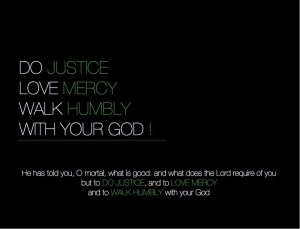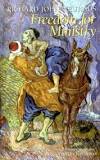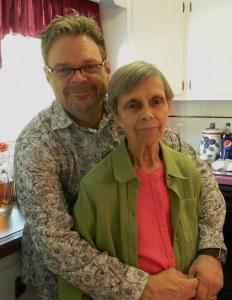How then shall we live in response to the homosexual question? The question begs to be answered in our schools, in our homes, in our local congregations, denominations and culture at large. Any discussion surrounding the issue is sure to solicit impassioned language of “right” and “wrong.” It turns on a question of ethics. It is a “moral” question. However, this way of seeing the issue merely polarizes the factions and degrades the discussion. Richard A. Norris, Jr.[1] clearly articulated the divisive nature and characteristics of the issue.
“In the first place, people are not, on the whole, in the habit of giving thought to questions of morality, since where such issues are concerned everyone already knows the correct answers of ahead of time. Thus a proposal to resort to reasoned argument will most likely evoke reactions of scorn, not to say skepticism. Much of the opposition to homosexuality grows, after all, out of what Augustine and Pelagius alike called consuetude—social customs—or out of a perception that it is simply tabu, or out of fear and contempt directed toward a phenomenon that comes across as shockingly unfamiliar and ‘abnormal.’ What is more, much of the popular defense of it amounts to little more than militant assertion of a vague ‘right’ to be whatever one is. To the extent that this is the case, however, moral considerations and arguments, of whatever sort, are bound to seem irrelevant, laborious and superfluous. In practice, the way to settle things—or so everyone seems to agree—is by the recitation of engaging and convincing catch phrases, and by the intermittent adoption of uncompromising poses. But then in the second place, as everyone knows, different people—including different Christians—often operate with different notions of what it is that makes something morally right or wrong, and so of what it is that grounds ethical judgments—and hence, though this circumstance is seldom noticed, of what makes a question a moral question.”[2]
How then shall we live in response to the homosexual questions? Dietrich Bonhoeffer is more widely known for the vitality of his theological work in The Cost of Discipleship and the short, nonetheless profound and very pastoral, Life Together. But in the first substantial posthumous Bonhoeffer monograph published only four years after his death-by-hanging at Flossenburg, Ethics provides a rare glimpse into the complexity of what the pastor and theologian termed “concrete values” as exhibited by his own strategic ethical determinations. If the reader of Ethics holds the content of the volume parallel to Bonhoeffer’s life, particularly his actions as a Christian dissident, advocate on behalf of German Jews and party to plans to murder Hitler, the reader will discover that Bonhoeffer points to the reality of God as the starting point of all Ethics. “Right living” in any concrete situation is empty without acceptance of the ultimate reality of God.
“Whoever wishes to take up the problem of a Christian ethic must be confronted at once with a demand which is quite without parallel. He must from the outset discard as irrelevant the two questions which alone impel him to concern himself with the problem of ethics, ‘How can I be good?’ and ‘How can I do good?’, and instead of these he must ask the utterly and totally different question ‘What is the will of God?”[3]
Therefore, Brothers and Sisters, where can we go but to the one and the same start pointing point? How then shall we live in response to the Homosexual question? The answer to the question is a question; “what is the will of God?”
This recommendation is not a polemic in favor of or against affirmation of homosexuality, same-sex orientation or the ordination of GLBT persons. It is not a refutation of exposition of specific scripture passages. It is not an attempt to change your beliefs or principles, regardless of what they may be. It is not an attempt to posit a scientific position on the question. It is not an attempt to further exacerbate the division, increase the tension or widen the chasm that exists within the church and between the church and the GLBT community at large. This recommendation is an attempt to call the church, as Christ-followers[4] to actively discern the will of God with respect to the question of homosexuality (and the various nuances with which the question is imbued) through the rightful engagement of the character of God as revealed through creation and incarnation, Word and scripture, action, reason and experience.
At the core of any debate on any issue within Christendom is scripture. This recommendation calls the congregation to evaluate scripture and determine its place within their “rule of faith.” Calvin, the Great Reformer said God is not an “unmoved mover”, but is active in the world and has purposes of his own. Calvin’s God is a “chief actor in a story in which he gives us roles to play. We ought not to rack our brains about God; but rather, we should contemplate him in his works.”[5]
To understand and know God it is imperative to pay attention to God’s acts. Those acts are more important and of much more consequence than any speculation about what God is. Those acts are detailed in Scripture. In Calvin’s words, “God bestows the actual knowledge of himself upon us only in the Scriptures.”[6] Scripture talks about a God who intervenes; hardens Pharaoh’s heart, parts the red sea, gathers his people in the wilderness and tabernacles with them. This God of scripture is active; he moves and speaks. Christian faith means affirming the centrality of the Bible. Just as Jesus is for us the Word of God disclosed in a person, so the Bible is the Word of God disclosed in a book. Being Christian means a commitment to the Bible as our foundational document and identity document.
The Bible is our story. It is to shape our vision of life—our vision of god, of ourselves, and of God’s dream for the earth.[7] However, Augustine of Hippo warned of a danger closely related to literal biblical interpretation as evidenced by the desire for absolutism so prevalent in certain sects of Western Christendom today. Augustine wrote that if we understand something, then what we understand is not God—not that it isn’t from God, but that the understanding itself cannot encompass Him. How can we really claim to serve an infinite God, but at the same time think it’s possible to understand more than just the most significant faction of who God is, let alone all of him? Many in Western Christendom worship the sacred text more than the God revealed in the text; they worship truth more than the revealer of truth. When we proceed in biblical or theological studies with the intention of attempting to know Truth, to uncover it through particular, measured methods, historical and scientific, we destroy the possibility of the impossible.[8]
God uses scripture to accommodate human capacity. Scripture takes on the role of both Guide and teacher in order that we may know him in his works. Yet, it is Calvin’s repeated analogy of scripture as “spectacles” that provided the most insight and profound illustration for the role of scripture in God’s self-revealing. “For just as eyes, when dimed with age or weakness or by some other defect, unless aided by spectacles, discern nothing distinctly; so, such is our feebleness, unless Scripture guides us in seeking God”[9] Through the “lens” of the Bible we see God. And because the Bible is not just about god, but about the divine-human relationship, though that lens we also see our life with God. What matters is not believing in the lens but seeing through the lens.[10]
The challenge to discern God’s will through the interpretation of scripture is overwhelming and daunting, but nonetheless necessary. The church is encouraged to evaluate and employ the many hermeneutical practices available in today’s exegetical toolbox such as Source Criticism, Form Criticism, Historical Criticism, Sociological interpretation, Redaction Criticism, Social-Scientific Criticism, Textual Criticism, Structuralism, Rhetorical analysis, Canonical Criticism, Narrative Criticism, Audience Criticism, Rule of Faith, Existentialist Interpretation, Feminist Biblical Interpretation, Reception Theory, Afro-centric Biblical Interpretation, Ideological Criticism, Womanist Biblical Interpretation, Postmodern Biblical Interpretation, Reader-response Criticism, Post-critical Biblical interpretation, Post-colonial Interpretation, Historical and Contextual critique, in addition to midrash, metaphorical, folklore and literalism.
Eugene Peterson rightly discerned that Christians feed on Scripture. Holy Scripture nurtures the holy community as food nurtures the human body. Christians don’t simply learn or study or use Scripture; (they) assimilate it, take it into (their) lives in such a way that it gets metabolized into acts of love, cups of cold water, missions into all the world, healing and evangelism and justice in Jesus’ name, hands raised in adoration of the Father, feet washed in company with the Son.[11] In all of our efforts to seek God’s will through the understanding of scripture, we dare not fail to see the Christo-centricity of the biblical narrative. Maximus the Confessor said, “So long as a person cleaves to the letter of Scripture, his inner hunger for spiritual knowledge will not be satisfied; for he has condemned himself like the wily serpent to feed on the earth—that is, on the outward or literal form—of Scripture (Genesis 3:14), and does not, as a true disciple of Christ, feed on heaven—that is, on the spirit and soul of Scripture, in other words, on celestial and angelic bread. I mean that he does not feed through Christ on the spiritual contemplation and knowledge of the Scriptures, which God gives unstintingly to those who love Him…And this in turn is followed by a complete ignorance of the deification given by grace according to the new mystery.”
The purpose of the bible is not to forever weld us to an ancient culture. The purpose of the bible is to tell us the story of Jesus’ life, death and resurrection.[12] Therefore, those who choose to follow Jesus will see Jesus as the center of the biblical story and interpret each passage in light of life of his ministry. In the words of Abbot Jacque Duguet, the “most sublime occupation for a theologian is to search for Jesus Christ amid the sacred books of scripture.” To quote Luther, “it is necessary to read scripture through the lens of the manger.” Reading the bible in a certain way changes the heart. The sacred text has the power to order the passions of the human soul into a receptive openness to God’s own character. When God’s character is revealed, God’s will is discerned.
We claim the Bible to be easy to understand, so easy that any child can understand it. But according to the Bible itself, at least some parts are very difficult to understand and easily misinterpreted. Bookstores are lined with as many translations of the Bible as there are shelves. Christianity in collusion with modernity commoditized the Bible like other products. In so doing, as recognized by Brian McLaren, “we unintentionally sanctioned misunderstandings and bastard readings.” The Bible’s ubiquity also fueled the perception that any individual may arrive at interpretations that are not only valid, but authoritative. This individualism transformed the bible from the sacred text that gathers the community of faith into the ubiquitous text that divides through a multiplicity of divergent interpretations.[13]
Community
The Character of God as revealed in Scripture and through the Word made flesh calls us to community. “From its very beginning,” wrote Leslie Newbigin, “the Bible sees human life in terms of relationships. This mutual relatedness, this dependence of one on another, is not merely part of the journey toward the goal of salvation, but it is intrinsic to the goal itself. For knowing God, we are dependent on the one whom he gives us to be the bearer of this relation…as a partner.”[14] God chooses – elects – both the one who bears and the one who receives the message, drawing them together in community for the purposes of the one whom God sends to be the bearer of his salvation. The deepest root of the contemporary malaise of Western culture is an individualism which denies the fundamental reality of our human nature as given by God—namely that we grow into true humanity only in relationships of faithfulness and responsibility toward one another.[15]
It is difficult at best, in religious organizations that are co-opted by a culture that promotes an ideology of individualism, to renounce our own ability and succumb to the call of Christ. But it is that renunciation, according to Bonhoeffer, that is the prerequisite and the sanction for the redeeming help that only the Word of God can give. Particularly in the midst of the schisms and brokenness that is evidenced in our denomination because of our responses to the question of homosexuality, Bonhoeffer’s words ring with proclaiming truth. “Our brother’s or sister’s ways are not in our hands; we cannot hold together what is breaking; we cannot keep life in what is determined to die. But God binds elements together in the breaking, creates community in the separation, grants grace through judgment.[16] This community has at its heart the remembering and rehearsing of his words and deeds, and the sacraments given by him through which it is enabled both to engraft new members into its life and to renew this life again and again through sharing in his risen life through the body broken and the lifeblood poured out. It exists in him and for him. He is the center of its life. Its character is given to it, when it is true to its nature, not by the characters of its members but by his character. Insofar as it is true to its calling, it becomes the place where men and women and children find that the gospel gives them the framework of understanding, the “lenses” through which they are able to understand and cope with the world.[17]
The Trinity
Jesus did not write a book, he formed a community. The invitation to join into the circle of God’s community is an invitation extended from the “one who loves in freedom” and is exemplified in the richness of the doctrine of the Trinity. The church’s ministry of healing is carried on in the midst of the suffering that comes from engaging with the powers; it is the very embodiment of characteristic and authentic Christian spirituality; and it is explained by the richest Christian theology—the doctrine of the Trinity, set within an eschatological framework in which the creator God designs to heal and renew the whole creation. Within the framework of the doctrine of the Trinity there is room for Christ-followers to discern God’s will with regard to the question of homosexuality. This recommendation is a call for the congregation to reclaim at the core of its faith the doctrine of the Trinity. For in the doctrine of the Trinity the characteristics of God are evidenced, there is missional clarity, and a call to healing and reconciliation.
“Follow me” or “Do as I have done unto you”
In the footwashing event recorded in the Gospel of John chapter 13 the movement of rising and laying, taking, girding and putting is followed by an implied movement downward to the disciple’s feet where the act of washing takes place. The movement of narrative in this passage skillfully reflects the movement ad extra of the Triune God.
(Jesus) “doth rise from the supper,
and doth lay down his garments,
and having taken a towel,
he girded himself;
afterward he putteth water into the basin,
and began to wash the feet of the disciples,
and to wipe with the towel with which he was being girded.”[18]
Jesus’ incarnational work not only created individual disciples, but called together a community of believers and gave them concrete ways to practice incarnation in his absence. And those ways become the identifying mark; agape one for another. Agape is intrinsically connected to actions manifested in and through mutual service and responsibility. This, then, is to become the realized narrative[19] for the community of believers. The imperative of John 13:15 and the command of John 13:34 is a call to incarnational living anchored in the mission of God. The significance of the mission of God in discerning the will of God cannot be overstated. It dominated the mind of Christ and became the “great commission” of the Johannine narrative. “As the Father has sent me, so I send you.”[20] Christ-followers have been called to practice incarnation.
The focal point of incarnation is that God identified with humanity in its lowest form and set about revealing God’s life-giving purposes for all of humanity through and in the person of Jesus Christ. Our own humanity is revealed in the humanity of Jesus Christ. “He confronted the unjust and death-bringing ways of the ruling elite. He brought wholeness, healing and abundance. He effected forgiveness and release and announced God’s loving purposes.”[21] “God’s love is not love from a distance, but love up close, love made manifest in a culturally particular, person-to-person way.”[22] As such, incarnational living is missional at its core. The movement is downward then outward.
“For I have set you an example that you also should do as I have done to you.” “Just as the infinite Creator became incarnate as a human to reach finite people, so the divine revelation must take flesh in human languages and cultures. Just as Christ chose to live in a particular time and setting, so we must incarnate our ministry in the contexts of the people we serve.[23] Incarnational living is a risky endeavor.
Risky Business
The dream of spanning the Golden Gate Strait in California had been around for well over a century before the Golden Gate Bridge opened to traffic in 1937. Construction began on January 5, 1933 and involved more than 10 different prime contractors, their subcontractors, countless engineers, designers and architects. The most difficult part of the construction was the task of connecting the two land sided anchors. Eleven men lost their lives during the construction of the Golden Gate Bridge, setting a new all-time record in a field where one man killed for every million dollars spent had been the norm. The most conspicuous precaution was the safety net suspended under the floor of the bridge from end to end. During construction, the net saved the lives of nineteen men who became known as members of the “Half-Way-to-Hell Club.” Bridge building is risky business.

The uniqueness of the Christian faith is its call to be distinct, walking in a way that sidesteps social and cultural norms. But the Christian faith calls for a specific distinction: love. Not the easily discardable kind of sentimental Valentine’s Day love, but the no-greater-love-hath-a-person for-their-friend-than-to-lay-down-their-life-for-them kind of love. Theologian Frances Schaeffer believed that love is the indelible mark that God gave to Christians to wear before the world. Only with this mark may the world know that Christians are indeed Christians and that Jesus was sent by the Father.[24] So, we’re called by Christ to be different by being loving—by choosing humility over hostility, by braving the unknown rather than huddling in safe enclaves, by daring to face people who we have offended and who have offended us, and inviting them into a reconciled relationship with God and one another.
The dichotomous relationship between the church and gay, lesbian, bi and transgendered (GLBT) persons has a traumatic history and continues to grow further apart. Each group talks past the other rather than to the other group. The result is that, by and large, the church knows gay people only in a narrowly focused two-dimensional light, and the GLBT community is left to search for God without the body of Christ to assist them, encourage them and validate their human existence as children of God.[25]
This recommendation is a call for the congregation to be in communion with gay, lesbian, bi and transgendered persons in its effort to discern God’s will with respect to the question homosexuality. This is not a request for Christians to change their beliefs, but for Christians to move past their pre-conditioned default responses. Christ-followers, in the mission of incarnation, are called to dialogue with and listen to the stories of our gay, lesbian, bi-sexual and transgendered brothers and sisters. To really see another is to see the Other, and to really love another is to love the Other. When we are truly known by another, we are known by God, and to be truly loved by another is to know the love of God. Dialogue is more than communication. It is communion in which we are mutually informed, purified, illumined, and reunited to ourselves, to one another, and God.[26] Reul Howe posits that every man is a potential adversary, even those we love. But “only through dialogue are we saved from this enmity toward one another. When dialogue stops or is non existent, love dies and resentment and hate are born. But dialogue can restore a dead relationship into being, and it can bring into being once again a relationship that has died.”[27] The best communication requires drawing near, whatever the cost. True communication is a risky endeavor.
The focal point of the GLBT-Christian relations is irrevocably linked to a set of questions that both communities not only ask each other, but have already each assigned their own right answers. Do you think gays and lesbians are born that way? Do you think homosexuality is a sin? Can a GLBT person change? Do you think that someone can be gay and Christian? Are GLBT people going to hell? Since the core questions will always be the same, we must elevate the conversation by reframing the questions.
Throughout the gospels Jesus was asked closed-ended questions twenty-five times by both his friends and enemies—eight times by the disciples, five by the Pharisees, four by the chief priests, four by Pilate and one time each by John the Baptist, the Jews, Sadducees, and the woman at the well. Out of the twenty-five closed ended questions asked of Jesus, fifteen of them were asked by his enemies trying to shrewdly trap him in his own words. Yet only once during his three-year public ministry, prior to his arrest and trial, did Jesus answer a closed-ended question with a closed-ended answer (Matthew 21:16). Instead of responding to his antagonizers through the traditional means, Jesus counter-culturally reframed each question in such a way that brought intentionality to overarching kingdom principles. This unmistakably demonstrates Jesus’ commitment to sticking to the process that he discerned best. So, with Jesus as our guide, the church is called to reframe the questions and elevate the conversation.
Welcoming Grace is bound up in the reconciling act of Jesus Christ and is a manifestation of the mission of incarnational living. Bonhoeffer called it the “truth of the Gospel in Jesus Christ,” and defined it as “the misery of the sinner and the mercy of God. For He has consigned all to disobedience in order that the may have mercy upon all.”[28] “God’s grace is free and sovereign, and there is no place for an exclusive claim on his grace, a claim by which others can be excluded.”[29] Welcoming Grace invites all to come to the table, and we, as Christ-followers cannot determine who is worthy of the grace of God. Grace is not a commodity to be sold on the open market to the highest bidder. It is the free gift of God firmly rooted in the covenant of grace.
God has always desired to hold his people in covenant embrace. Time after time, God has said and is saying, “I will be their God and they will be my people.” In faithfulness to that covenant, God in righteousness reached from the hindermost parts of what our frail language can only describe as the universe and he touched humanity. And the Word became flesh and dwelt among us, and we beheld his glory as of the only begotten of the father. God revealed himself to us through his son, Jesus Christ and it is Jesus Christ who sets the table. It is his table and no human being can keep another human being from it. In the Gospel of Mark we are reminded of a time when the multitude was hungry, and the response from the disciples was “Lord Send them away.” But Jesus did not send them away. He did not send them away then and he does not send them away today. There are many in the world who want to “come home,” but as Mother Teresa aptly expressed, “they can’t come home because none of the family are there to receive them.”
Descend into hell
This recommendation is that the church broaden its preoccupation with propositions to include the Mission of God; become students, seekers and learners of scripture who reclaim the doctrine of the Trinity and answer the call to incarnational living as it discerns God’s will in response to the question of homosexuality. This process is not about a “hot-button-issue”; it is about faces, friends and children of God. It is about Jesus Christ, whose love many find hard to grasp because of what they have felt from his followers. Ultimately, they will know we are Christians, not by our proof-texting, but by our love.
“If the locus of the revelation of God was once in Jesus, it is now among and through the community of believers. If you will, the community of believers displays the continuing incarnation.[30] As a reflection of the incarnation, the movement ad extra of the Triune God must be the same; downward for us and outward through us. The implication of such a realized narrative lived cannot be dismissed. In the least, it will be counter-cultural and at its most drastic, it will be life expending. As revealed in scripture and confirmed in the Apostle’s Creed, Jesus Christ himself descended into Hell. As such, “He (Jesus) challenges us to face our fellow man without fear and to enter with Him in the fellowship of the weak, knowing that it will not bring destruction but creation, new energy, new life, and in the end, a new world.[31] After all, following Christ is risky.
Works Cited
Attridge, Harold W., Editor. Harper Collins Study Bible / New Revised Standard Version. San Francisco: Harper One, 1989.
Billings, J. Todd. “Incarnational Ministry and Christology: A Reappropriate of the Way of Lowliness.” Missiology: An International Review, Vol. XXXii, No. 2, 2004.
Bonhoeffer, Diethrich. Life Together, A Discussion of Christian Fellowship. New York: Harper & Row Publishers, 1954.
Bonhoeffer, Dietrich. Ethics. New York: MacMillan Company, 1964.
Borg, Marcus J. & Wright, N.T. The Meaning of Jesus Two Visions. New York: Harper Collins, 1989.
Borg, Marcus. The Heart of Christianity. San Francisco: Harper Collins Publishers, 2003.
Calvin, John. Institutes of the Christian Religion Volume I. Louisville: Westminster John Knox, 1960.
Carter, Warren. John: Storyteller, Interpreter, Evangelist. Peabody: Hendrickson, 2006.
Harrison, Joel. Who’s Authority. blog, http://www.churchunbound.wordpress.com/2010/11/02, 2010.
Hiebert, Paul G., and Eloise Hiebert Meneses. Incarnational Ministry; Planting Churches in Band, Tribal, Peasant, and Urban Societies. Grand Rapids: Baker Books, 1995.
Howe, Reul L. The Miracle of Dialogue. Chicago: Seabury Press, 1963.
Keck, Leander E. New Interpreter’s Bible Volume IX. Nashville: Abingdon, 1995.
Kysar, Robert. John the Maverick Gospel. Louiseville: Westminster John Knox, 2007.
Marin, Andrew. Love Is An Orientation Elevating the Conversation with the Gay Community. Downers Grove: InterVarsity Press, 2009.
McLaren, Brian D. & Campolo, Tony. Adventures in Missing the Point How the Culture-controlled Church neutered the Gospel. Grand Rapids: Zondervan , 2003.
Newbigin, Lesslie. The Gospel in a Pluralist Society. Grand Rapids: William B. Eerdmans Publishing Company, 1989.
Norris, Richard A. “Some notes on the Current Debate regarding Homosexuality and the Place of Homosexuals in the Church.” Anglican Theological Review, 2008: 437-511.
Nouwen, Henri J. M. Intimacy. New York: Harper Collins, 1969.
Peterson, Eugene H. Eat This Book. Grand Rapids: William B. Eerdmans Publishing , 2006.
Rogers, Jack. Jesus, The Bible and Homosexuality / Explode the Myths, Heal the Church. Louiseville: Westminster John Knox Press, 2006.
Schaeffer, Francis. The Mark of the Christian. Downers Gove: IVP Books, 2006.
[1] Richard A. Norris, Jr. is Professor Emeritus of Church History at Union Theological Seminary and Priest Associate of the Church of St. Ignatius of Antioch and Diocesan Canon in the Diocese of New York
[3] (Bonhoeffer 1964) pp 55.
[4] “Disciple” and its derivatives are terms which have been drained of potency of meaning within present day culture and sadly, within most sects of Christianity. As such, I deliberately use the phrase “Christ-followers” in lieu of “disciples” as a forceful means of bringing to remembrance the nature and characteristics, words and deeds of the person who tenderly spoke the imperative “Follow me.” In the words of Karl Barth, “There is no humanity outside the humanity of Jesus Christ or the voluntary or involuntary glorifying of the grace of God which has manifested itself in this humanity.”
[10] (M. J. Borg 1989) p 240
[11] (Peterson 2006) p 18
[14] (Newbigin 1989) p 82-83
[15] (Newbigin 1989) p 231
[16] (D. Bonhoeffer 1954) p 108
[17] (Newbigin 1989) p 227
[19] Leslie Newbign’s term “realized narrative”
[20] (Attridge 1989) NRSV John 20:21b
[21] (Carter 2006) pp. 212
[23] (Hiebert and Meneses 1995) pp. 370
[24] (Schaeffer 2006) p 59
[28] (D. Bonhoeffer 1954) p 111.
[29] (Newbigin 1989) p 86.
[30] (Kysar 2007) pp. 135
[31] (Nouwen 1969) pp. 37










